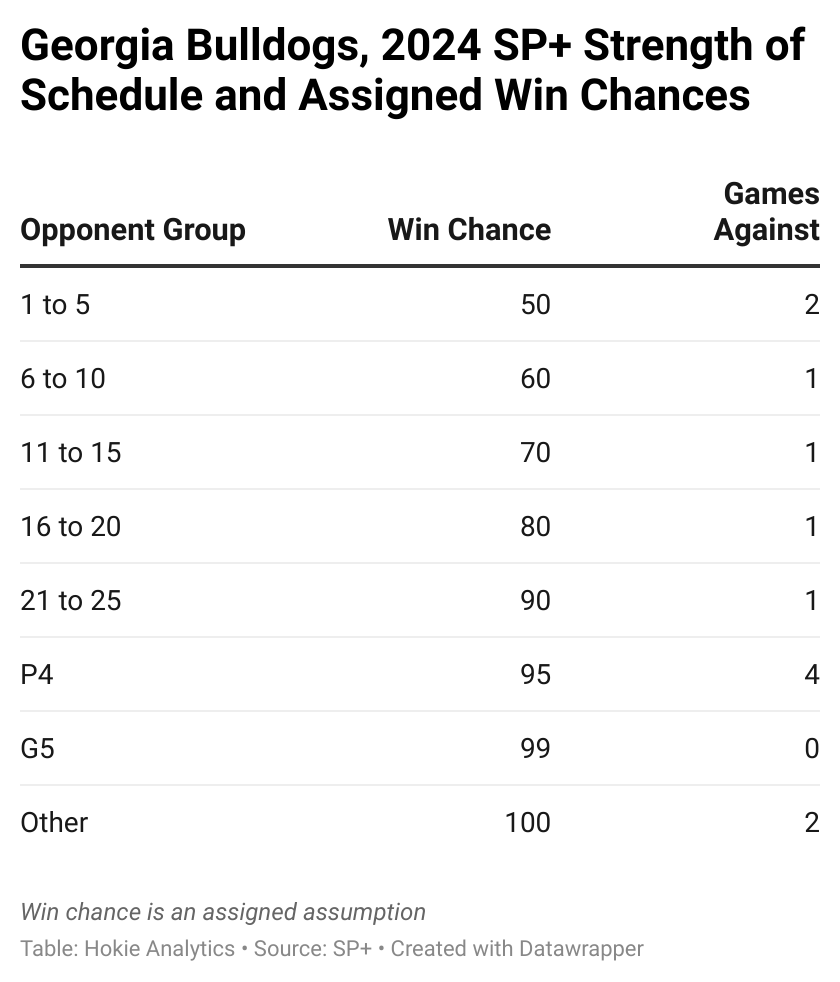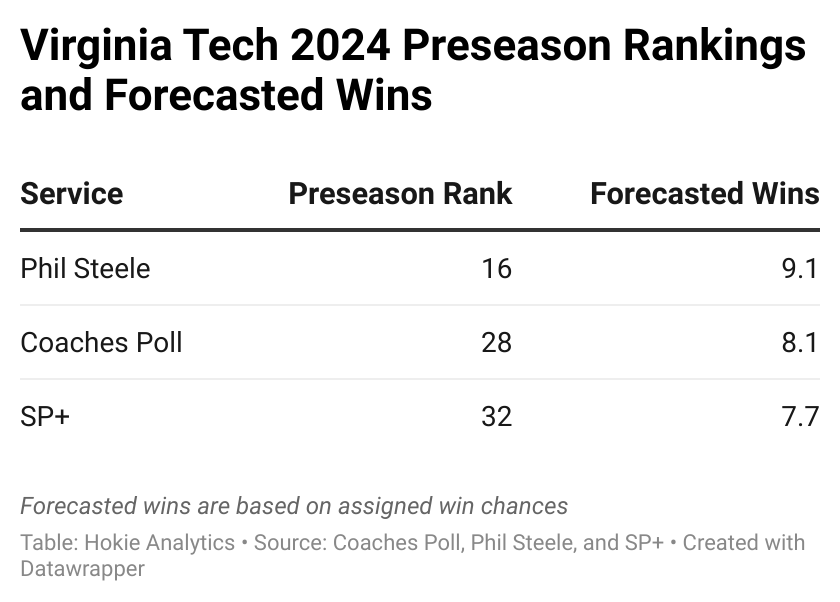Strength of Schedule: A Blessing or a Curse in 2024?
Wildly varying schedule strength among college football's top teams brings uncertainty in first year of 12-team playoff
One underappreciated byproduct of conference realignment is that some teams will have an absurdly difficult strength of schedule (SOS), while others, even in power conferences, will play comparatively easy schedules.
This year will offer a glimpse of how the playoff committee will adjudicate the SOS issue, as well as the follow-on political considerations that come with the number of spots allotted to each conference.
In years when Notre Dame qualifies, expectations are for allocations to track as follows:
SEC - 4 bids
Big Ten - 3 to 4
ACC - 1 to 2
Big 12 - 1 to 2
Notre Dame
Highest ranked G5 conference champion
One of the biggest hurdles non-P2 (SEC and Big Ten) teams will face is the perception of the strength of those leagues, and how that perception will guide discussions about strength of schedule.
Making apples to apples comparisons between conferences, which was already difficult, will be all the more challenging this year with conference realignment leading to less non-conference matchups between P4 teams.
If Virginia Tech is really a playoff contender, as I believe the Hokies are, then that begs the question: How many games does the team need to win to secure a playoff berth?
Projecting wins and losses based on SOS
To get a sense of where the top teams are likely to land, record-wise, I ran some calculations that look solely at the SP+ top 25 and group win chances by the opponent’s strength.
Ranked opponents were bucketed by fives (e.g., #1-5 nationally, then #6-10, etc.) for the top 25, while unranked opponents were labelled either P4, G5, or Other.
For each team, I counted the number of opponents in each strength grouping. Those totals were then multiplied by the assigned win chances, which depended on the team under consideration.
For demonstration purposes, here is how top ranked Georgia looks:

The Bulldogs will face six teams ranked in the SP+ top 25, two of which are in the top 5. That’s pretty brutal!
In contrast, preseason #7 Penn St. will face only two top 25 teams. One Nittany Lion opponent is ranked in the top 5, while the other is between 21 and 25.
So you tell me, if both teams end the year with a 10-2 record, whose getting the higher seed and/or last remaining playoff birth?
Georgia, right?
Maybe.
It depends on how all the other SEC teams perform. Five are ranked in the top 10, six in the top 12.
Political considerations mean that it is highly unlikely that one conference will get more than four bids.
Imagine a world in which the SEC gets five teams in, the Big Ten gets three, and Notre Dame punches a ticket. That would leave the ACC, Big 12, and the entire G5 with three spots, one for each.
Under this hypothetical, I could almost guarantee that within 72 hours somebody would file an anti-trust suit. I’m not saying they’d win, but I doubt anyone has a taste for the kind of ugliness that such a move would generate, especially if one considers the 2023 Florida St. snub.
All of this is to say that there is great uncertainty about how teams will be seeded. With so much good-on-good lined up in 2024 during the regular season, things could get muddled in a hurry.
The good news for the Hokies is that there is no clear elite team in the ACC. The bad news is that even if the ACC nets two bids this year, Tech will still face an uphill battle to secure one of them.
What it will take for Virginia Tech to make the playoff
SP+ includes four ACC teams among its preseason top 25. Based on schedule strength, their forecasted records (based solely on my SOS model) are as follows:
#12 Florida St.: 9.4 wins, 2.6 losses
#14 Clemson: 9.5 wins, 2.5 losses
#19 Miami: 9.5 wins, 2.5 losses
#23 SMU: 8.9 wins, 3.1 losses
Extending the methodology down to Virginia Tech, which is #32 in the preseason SP+ ranking, yields 7.7 forecasted wins for the Hokies and 4.3 losses.
But what if SP+ is wrong?
Tech is #28 according to the coaches, which would mean 8.1 wins and 3.9 losses.
The Hokies’ highest preseason ranking, #16, which comes from Phil Steele, translates to 9.1 wins and 2.9 losses.
All of this leads me to the following conclusions:
The ACC champion is likely to go 10-2 in the regular season, therefore entering the playoff with an 11-2 record and a better-than-even chance at securing the #3 seed, even though the team is likely to be ranked around #10 by the Associated Press.
The team that losses the ACC championship game will have a minimum of three losses and potentially four, either of which will probably eliminate it from playoff contention.
At baseline, Virginia Tech is an eight-to-nine win football team in 2024. That should be good enough to keep the Hokies in the playoff conversation for most of the season, but from the outside looking in.
Putting it all together, in order to make the playoff, at minimum, the Hokies need to:
Win 10 games, which means stealing a game or two that they would otherwise be expected to lose, the most likely of which are at Miami and at Syracuse
Go undefeated in the four non-conference games
Beat Clemson or Miami, and the team they beat needs to play in the ACC championship
Win the ACC championship game if they play in it
Concluding thoughts
Virginia Tech has, on its face, a pretty light schedule. The only opponents in the SP+ preseason top 25 are Clemson and Miami, and the Hokies get the Tigers at home.
There are, however, a number of tricky road games the Hokies will have to navigate, including the aforementioned trip to upstate New York as well as the cross-country venture to Palo Alto, California to play Stanford.
On paper, a loss in either game would look pretty bad. And like it or not, looks matter when it comes to selecting playoff teams.
If we assume that both of those games will be nerve-rackingly close, then the difference between making the playoff and going to a mid-tier bowl will be Tech’s ability to grind out ugly wins, maybe via a late field goal or defensive stand.
With almost all of last year’s starters returning, as well as excellent special teams units across the board, Tech is positioned to outperform expectations.



